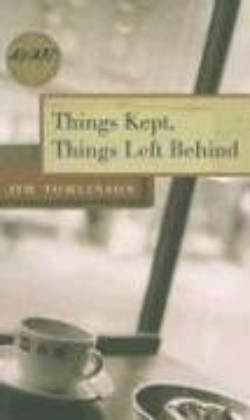Things Kept, Things Left Behind
The 2006 winner of the prestigious Iowa Short Fiction Award, this debut collection mines a neglected niche of literary territory—working-class Eastern Kentucky—in much the same way that Alice Munro explored rural Canada, with the same trusting attention to lost chances and hard luck. Though fashions in fiction have lately been those of an exuberant authorial voice, a racing overdrive of dazzlingly self-conscious language, this volume has the deliberate pace of a tractor on the back roads: one can either by-pass or follow behind and observe its slowly unfolding landscape views. Sometimes, slow is better.
A couple’s adultery is told between the two linked stories of the title, though the consequences and discoveries are unexpected, almost invisible. In “Things Left Behind,” Dexter Chalk and LeAnn McCray, a high school couple, get reacquainted in their less lovely adult lives, and it’s only through the helpful gesture of the motel maid returning Dex’s “sobriety journal” she can’t read English, but its handwritten entries remind her of a missal) to LeAnn, who rented the room, that their trysts are exposed to LeAnn’s husband, who opens her mail in a fit of rage. But the conclusion’s fireworks are so carefully circumvented, so writerly in observation “as if the organ stop of Plaintive had gotten stuck”), that the reader is left to ponder the title again, how the history of secrets still lives.
Similarly, in “Things Kept,” LeAnn’s mother who, unlike her daughter, is a pure plain model of the suffering, loyal wife) circumvents the selling of a family heirloom Dex would broker the deal) in a way that almost defies physics, leaving LeAnn stranded, feeling a silent “howl … piercing, like something wrenched raw from an orphaned soul” inside her.
The author has published short fiction in Five Points, the Pinch, and Shenandoah. He was awarded the 2005 Al Smith Fellowship for Fiction by the Kentucky Arts Council, and is working on his first novel.
Of the remaining nine stories in his first collection, only “Prologue two lives in letters)” ambitiously eyes a larger, generational sweep of American history. Seventeen letters from 1963—1997 begin between two teenagers meeting at a Congressional Youth Leadership Conference in the capital—one a poor Kentucky boy, the other a Connecticut Ivy League girl. But their career trajectories and notational thoroughness snail mail!) are so predictably summarized that the characters seldom rise from being dutiful words on a page. He becomes a Canadian draft-dodger and the father of a drug-using son; she becomes a U.S. Representative, divorcing her husband after he’s indicted for insider-trading scandal.
A willingness to show the stubborn human toll of current events is honorable, and Tomlinson’s devotion to such details of his characters’ lives is the chief virtue that readers will take from this sensitive volume.
Reviewed by
Leeta Taylor
Disclosure: This article is not an endorsement, but a review. The publisher of this book provided free copies of the book to have their book reviewed by a professional reviewer. No fee was paid by the publisher for this review. Foreword Reviews only recommends books that we love. Foreword Magazine, Inc. is disclosing this in accordance with the Federal Trade Commission’s 16 CFR, Part 255.

